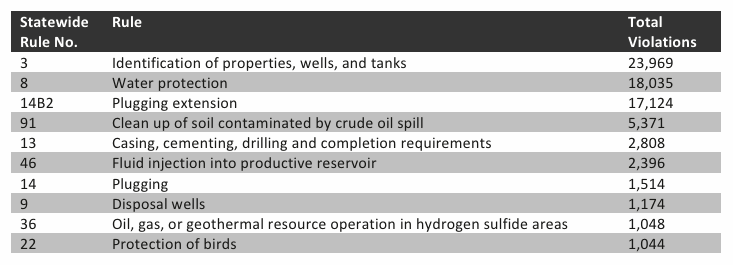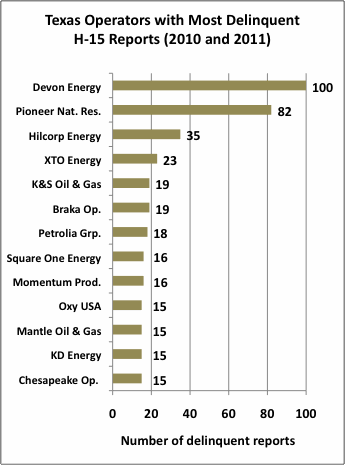Texas Oil & Gas Enforcement - Violations
Violations data - limited, incomplete
According to the Texas Sunset Advisory Commission, “When [RRC] inspectors uncover violations of statute or Commission rule, they report the violations to the district office for review, and the agency sends a notice of violation [NOV] to operators.”[1]
At the present time, RRC does not have a publicly accessible database that allows the public to examine the violations recorded by RRC inspectors or the NOVs sent to operators every year.
Rider 17 of the 2012-2013 General Appropriations Act required the RRC to publish information about violations on its web site.[2] In 2012, RRC began posting summary statistics of violations on a quarterly basis. It would be more useful and transparent for the RRC to create a publicly accessible database of the violations. An on-line database of oil and gas violations exists in Pennsylvania, and other states like Ohio also make violations data available electronically. It is not clear if RRC plans to create such a database.
It would be useful to know which rules in particular are being violated, as this might help the RRC and citizens to track the types of violations that are most problematic for operators. In 2009, RRC provided the Texas Sunset Advisory Commission (“Sunset Commission”) with statistics on the top ten most frequently violated rules in the state. The data are summarized in this table.
Ten Railroad Commission of Texas rules most frequently violated in 2009

Click chart for larger, footnoted version
According to the Sunset Commission, the RRC tracks the number of violations of statewide rules per year, but until 2012 violations by statewide rule were not posted anywhere on the agency’s web site. Because of Rider 17, RRC now publishes quarterly statistics on violations by statewide rule, but for some unknown reason only does so for a small portion of the total number of alleged violations. For example in the first quarter of 2012 there were 13,196 “alleged violations identified through oil and gas inspections,” but just 140 of those were itemized by rule number. It is not clear why only a small subset of the alleged violations are itemized by rule number.
Looking at limited data provided for the first three quarters of Fiscal Year 2012, there are certain rule violations that stand out. Rules with the most violations are: No. 14 (Plugging - 357 violations), No. 8 (Water Protection - 194), and No. 3 (Identification or properties - 132).
Violations down, but compliance still a problem

Prior to 2012, RRC did not publish any violation statistics on its web site. We were able to find some violations data in RRC and non-RRC reports. As seen in the chart, between 2006 and 2010 the number of oil and gas violations recorded by RRC inspectors decreased from approximately 90,000 to just over 71,000.[3] Meanwhile, as seen in the chart, the number of inspections increased between 2006 and 2009.
The trend Texas is contrary to what has been observed in other states: typically, when inspections increase, more violations are found (for examples, see our information on inspections and violations in Pennsylvania and Ohio).
There are a few ways to interpret the Texas violations statistics:
- It is possible that by conducting more inspections there has been a more visible presence of Texas RRC personnel in the field, causing operators to work more carefully, and violations to go down.
- Alternatively, it is possible that inspectors did not find as many violations in 2010 because the inspections were not as thorough as they were in 2006. Between 2006 and 2010 the number of inspectors remained fairly constant (87 in 2006, 88 in 2010), but there were approximately 3,500 more inspections in 2010 than in 2006, meaning inspectors spent less time on each inspection.
-
It is also possible that inspectors simply stopped issuing violations for minor offenses, or that inspectors were instructed to treat violations differently in recent years. For example, regulatory agencies under administrations that wish to encourage oil and gas development and emphasize employment and revenue over public safety could direct agency personnel to avoid issuing violations and instead talk to operators about their observations.
It is possible that 'less serious' violations are no longer receiving official Notices of Violation (NOV), and therefore, the numbers do not appear in violations statistics.Former Railroad Commission District Director, Mark Henkhaus, recently wrote that, “I know that a Commission field technician is able to detect 'technical violations' on almost any lease or well site. . . many less-serious violations are dealt with in the Commission’s district office by district staff in person, on the telephone. . .”[4]
Despite the drop in violations, the fact that there were 70,000 violations in 2010 makes it clear that a very serious problem with compliance still exists in Texas. In 2010, RRC inspectors consistently recorded more violations per inspection than their counterparts in other states.[5] In 2010, RRC inspectors found 0.6 violations per inspection, while inspectors and Pennsylvania and Ohio found 0.2 and 0.1 violations, respectively.
Companies repeatedly violate the same rules
The Sunset Commission, which reviewed the RRC enforcement program in 2011, stated that “part of the reason for the large number of violations is that the Commission’s enforcement process is not structured to deter repeat violations.” The Sunset Commission also found that “the [RRC] does not specifically track repeat violations unless the violation is one of the 4 percent brought forward to enforcement.[6]
Data compiled by Earthworks from the RRC severance database reveals that there operators who repeatedly violate certain RRC rules.[7] This database includes information on wells that have been required to stop producing oil and/or gas because of rule violations. shows that for some oil and gas operators, receiving a violation does not appear to deter them from breaking the same rules over and over again. This section outlines two indicators that behavior may not be seriously affected when companies are issued a violation are that: 1) companies violate the same rules on many well sites (one violation does not alter their behavior); and 2) companies repeatedly violate the same rule (i.e., have recurring violations). Both trends indicate that some companies have little regard for the rules. As a result, the Commission cannot be certain that operators are not committing repeated violations.”

Click chart for larger version
Companies violate the same rule on many well sites: In Texas, operators with inactive wells are required to conduct a well integrity or H-15 test “to establish that an inactive well over 25 years old does not pose a potential threat of harm to natural resources, including surface and subsurface water, oil and gas.”
Data from the severance database show that over a two-year period (2010 and 2011), there were 1,713 delinquent H-15 reports for natural gas leases. As seen in the chart, there were thirteen companies with 15 or more delinquent H-15 reports for gas leases during this period.[8] Devon Energy and Pioneer Natural Resources were by far the worst offenders, failing to file 100 and 82 H-15 reports, respectively.
Companies repeatedly violate the same rule on the same site: When specific well records were examined, they showed that companies repeatedly violate the same rules at the same facility. For example, in 1995, 1997, 1999, 2002, 2004, and 2006 Chesapeake Operating, Inc. was sent certified letters for failing to file H-15 forms for the Detijerina, H.C. lease as required by law. Similarly, Devon Energy Production Company, L.P. was issued certified letters because of delinquent H-15 filings on its Fagan H.F. lease in 1994, 1995, 1996, 1999, 2001, 2002, 2003, 2004, and 2009.
There is no doubt that many other examples exist of companies repeatedly violating the same rules in Texas. Unfortunately, because the RRC does not yet have a publicly available database of violations, it was not possible to determine the full scope of the problem.
The data above show that despite repeated issuance of violations and oil and gas severances/seals, operators continue to violate the same rules – sometimes on the same well site, sometimes at many of their well sites. The repeated occurrence of the same violation shows a pattern of disregard for RRC rules, and the environment. To reduce the number of repeat violations, RRC should significantly escalate penalties for repeat offenses.
For more information:
- Earthworks: Enforcement Report - RRC: Public should not have confidence that oil and gas development is occurring responsibly in Texas. Report
- Earthworks: Texas Oil & Gas Enforcement. Web page
- Earthworks: Texas Oil & Gas Enforcement - Inspections. Web page
- Earthworks: Texas Oil & Gas Enforcement - Violations. Web page
- Earthworks: Texas Oil & Gas Enforcement - Enforcement Actions. Web page
- Earthworks: Texas Oil & Gas Enforcement - Public Participation. Web page
Endnotes
1 Sunset Advisory Commission. July 2011. Final Report - Railroad Commission of Texas. p. 31.
2 “Out of the monies appropriated to the Railroad Commission of Texas for Strategy D.1.2, Public Information and Services, the agency shall publish information about enforcement data on its website, including inspection and enforcement activity, violations and the amount of final enforcement penalties assessed to the operator. The agency shall also make available on its website quarterly trends of enforcement data, including . . . the number and severity of violations sent for enforcement action, the number of violations sent for enforcement action for each Commission rule, and the number of repeat violations found for each operator. (Source: General Appropriations Act for the 2012-13 Biennium. 82nd Texas Legislature Regular Session, 2011. Sept. 12, 2011.p. V-60.
3 The table below contains inspections and violations data, including data sources.
Texas oil and gas inspections and violations data

Click chart for larger, footnoted version
4 Letter from Mark Henkhaus, EXCO Resources to Ramon Fernandez, Railroad Commission of Texas. March 12, 2012. Re: Comments on Proposed 16 TAC 3.107 Statewide Rule 107: Penalty Guideline for Oil and Gas Violations. p. 2.
5 The table below contains inspections and violations data for Texas, Pennsylvania and Ohio.
Comparison of state violations-per-inspection data

Click chart for larger, footnoted version
6 Sunset Advisory Commission. July 2011. Final Report - Railroad Commission of Texas. p. 34.
7 The RRC Severance Database does not, however, include all violations because most wells with violations are not ordered to stop producing oil and/or gas. In 2010, for example, approximately 7,000 severances/seals were issued, while the RRC recorded more than 70,000 violations. (Sources: Violations data from: Railroad Commission of Texas presentation. July 2011. Slide 51. Severance data from: Railroad Commission of Texas Online System. Oil and Gas Data Query. Severance Query. Search: oil and gas wells, Severance/Seal letter date between 01/01/2010 and 12/31/2010. All, i.e., Outstanding and Resolved).
8 Railroad Commission of Texas Online System. Oil and Gas Data Query. Severance Query. Search Criteria – Well Type: Gas, Severance/Seal Cert. Ltr. Reason: Delinquent H-15. Severance/Seal Letter Date: 01/01/2010 to 12/31/2011. Current records. Data accessed Feb. 29, 2012.
Tagged with: violations, texas railroad commission, texas, regulations, fracking, enforcement, drilling
Follow Earthworks